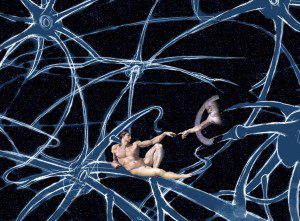 As a kid, I created whole worlds in my bedroom out of Legos. For my tenth birthday, I asked for more Legos to expand my building power. I wanted to conquer bigger and better worlds. My son just turned ten. His surprise gift was a virtual world in Minecraft Realms, an almost infinite digital space for him to share with close friends. He lets me play with him there too. We have building competitions. (I lose.) He creates jump-scare digital haunted houses. (I get startled.) He leads me like a general to sudden-death games on public servers. (I die more suddenly than he would like.) Eventually, my son’s toys will become his tools. Then his tools will shape his daily life at home and at work. They will even shape his faith. They may become his idols. As many times as it has been said before, it needs to be said again. New technologies are the greatest challenge and opportunity for people of faith.
As a kid, I created whole worlds in my bedroom out of Legos. For my tenth birthday, I asked for more Legos to expand my building power. I wanted to conquer bigger and better worlds. My son just turned ten. His surprise gift was a virtual world in Minecraft Realms, an almost infinite digital space for him to share with close friends. He lets me play with him there too. We have building competitions. (I lose.) He creates jump-scare digital haunted houses. (I get startled.) He leads me like a general to sudden-death games on public servers. (I die more suddenly than he would like.) Eventually, my son’s toys will become his tools. Then his tools will shape his daily life at home and at work. They will even shape his faith. They may become his idols. As many times as it has been said before, it needs to be said again. New technologies are the greatest challenge and opportunity for people of faith.
This Is Nothing New Under the Sun.
 Martin Luther allegedly considered the printing press to be “God’s highest and extremist act of grace, whereby the business of the Gospel is driven forward.” Luther was wise, but his approach to technology still didn’t recognize how it shapes our experience of the world. As a Christian like Luther, I believe technology has been part of God’s plan from the beginning. Before the Fall, God told Adam to tend the garden, a command that implies tools and technology according to John Dyer. Even Jesus himself was described as a tekton, a word related to our word for “technology.” When talking about technology, though, the Greeks were less interested in the tools than in the skills of the people who used the tools. In the past twenty years, the pace of technological change has made it hard for us to become masters of our devices before they are replaced by new devices. Over the centuries, our technologies have advanced from the Roman codex to Chinese papermaking to German moveable type to telegraph to telephone to television to computers and networks and an internet of things. Any brief history of technology can start to feel like the Biblical genealogies. Abraham was the father of Isaac. Isaac was the father of Jacob. And on and on until we encounter Jesus.
Martin Luther allegedly considered the printing press to be “God’s highest and extremist act of grace, whereby the business of the Gospel is driven forward.” Luther was wise, but his approach to technology still didn’t recognize how it shapes our experience of the world. As a Christian like Luther, I believe technology has been part of God’s plan from the beginning. Before the Fall, God told Adam to tend the garden, a command that implies tools and technology according to John Dyer. Even Jesus himself was described as a tekton, a word related to our word for “technology.” When talking about technology, though, the Greeks were less interested in the tools than in the skills of the people who used the tools. In the past twenty years, the pace of technological change has made it hard for us to become masters of our devices before they are replaced by new devices. Over the centuries, our technologies have advanced from the Roman codex to Chinese papermaking to German moveable type to telegraph to telephone to television to computers and networks and an internet of things. Any brief history of technology can start to feel like the Biblical genealogies. Abraham was the father of Isaac. Isaac was the father of Jacob. And on and on until we encounter Jesus.
The New Song of Technology
 If we listen closely to our technology, my son and I can hear its prophets. They sing a new song of a new heaven and a new earth and a new messiah emerging from the singularity. (With institutions like Singularity U, it is not hard to imagine the worship of technology becoming an accepted religion in our culture.) As a Christian, I shudder at the thought of worshipping technology, but I also wonder what interfaith dialog would look like between a Christian and a Transhuman Singularist. Even if we don’t idolize technology, most of us, like Martin Luther, expect technology to help us spread our own ideas and expand our own influence. However, we are likely serving our devices more than they are serving us. This is the conclusion reached by Howard Gardner and Katie Davis in their recent book The App Generation. In their sociological research, they found “apps that allow or encourage us to pursue new possibilities are app-enabling. In contrast, when we allow apps to restrict or determine our procedures, choices, and goals, we become app-dependent.” Unfortunately, they also found that many more people are app-dependent than app-enabled.
If we listen closely to our technology, my son and I can hear its prophets. They sing a new song of a new heaven and a new earth and a new messiah emerging from the singularity. (With institutions like Singularity U, it is not hard to imagine the worship of technology becoming an accepted religion in our culture.) As a Christian, I shudder at the thought of worshipping technology, but I also wonder what interfaith dialog would look like between a Christian and a Transhuman Singularist. Even if we don’t idolize technology, most of us, like Martin Luther, expect technology to help us spread our own ideas and expand our own influence. However, we are likely serving our devices more than they are serving us. This is the conclusion reached by Howard Gardner and Katie Davis in their recent book The App Generation. In their sociological research, they found “apps that allow or encourage us to pursue new possibilities are app-enabling. In contrast, when we allow apps to restrict or determine our procedures, choices, and goals, we become app-dependent.” Unfortunately, they also found that many more people are app-dependent than app-enabled.
The Generals of Technology
 Sebastian Thrun, CEO of Audacity and Founder of Google X argued against this perspective at the 2014 Aspen Ideas Festival. He said, “I believe technology is not shifting our moral belief. Our morals are independent. It shifts what we can do… The basic moral beliefs about dignity of human life and respect, these will be mediated by technology. And technology will give people better chance to achieve these goals.” People will be app-enabled. Thrun is right in a sense. For the CEOs of Silicon Valley, technology will empower the moral beliefs of the creators. As one of the creators, Thrun himself sees no threat to moral belief. At the same conference, Ping Fu, Chief Strategy Officer for 3D systems put it this way. “I believe our moral compass often influences what technology we work on.” I would go a step further and expect to find the moral compass of any creator embedded within the creation. Steve Jobs’ belief in control and minimalism led to the creation of the Apple ecosystem’s beautiful walled-garden. Mark Zuckerberg’s belief in “The Hacker Way” is building an open and connected platform that does not always value privacy as much as some would like. In his most controversial book, The Abolition of Man, C. S. Lewis considered our desire to conquer nature through technology, to shape our world, ourselves, and our morality. In 1943, he wrote,
Sebastian Thrun, CEO of Audacity and Founder of Google X argued against this perspective at the 2014 Aspen Ideas Festival. He said, “I believe technology is not shifting our moral belief. Our morals are independent. It shifts what we can do… The basic moral beliefs about dignity of human life and respect, these will be mediated by technology. And technology will give people better chance to achieve these goals.” People will be app-enabled. Thrun is right in a sense. For the CEOs of Silicon Valley, technology will empower the moral beliefs of the creators. As one of the creators, Thrun himself sees no threat to moral belief. At the same conference, Ping Fu, Chief Strategy Officer for 3D systems put it this way. “I believe our moral compass often influences what technology we work on.” I would go a step further and expect to find the moral compass of any creator embedded within the creation. Steve Jobs’ belief in control and minimalism led to the creation of the Apple ecosystem’s beautiful walled-garden. Mark Zuckerberg’s belief in “The Hacker Way” is building an open and connected platform that does not always value privacy as much as some would like. In his most controversial book, The Abolition of Man, C. S. Lewis considered our desire to conquer nature through technology, to shape our world, ourselves, and our morality. In 1943, he wrote,
Each new power won by man is a power over man as well. Each advance leaves him weaker as well as stronger. In every victory, besides being the general who triumphs, he is also the prisoner who follows the triumphal car. The battle will indeed be won. But who, precisely, will have won it? For the power of Man to make himself what he pleases means, as we have seen, the power of some men to make other men what they please.
Let Faith, Not Devices, Define You
 In every victory, the general’s morality will find its way into the technology that shapes the prisoner’s lives. Our toys become our tools. Our tools can define our identities and moralities. More than ever, we need the time-tested wisdom of ancient faith, free from annual upgrades and consumer trends. Consumers are not prisoners, and developers are not generals. But we are all servants. Refuse the role of general and prisoner. A Christian’s role is not to create new worlds, but to serve the Creator in this world. Technology provides new ways to serve, but it becomes an idol when we let it tell us who we are. [Synaptic Gasp by Maureen Flynn Burhoe; Martin Luther Detail by Universal Pops; singularity u intro inworld by Ina Centaur; Sebastian Thrun, Udacity by J. D. Lasica; Christ of the Abyss by vgm8383; all images used via Creative Commons.]
In every victory, the general’s morality will find its way into the technology that shapes the prisoner’s lives. Our toys become our tools. Our tools can define our identities and moralities. More than ever, we need the time-tested wisdom of ancient faith, free from annual upgrades and consumer trends. Consumers are not prisoners, and developers are not generals. But we are all servants. Refuse the role of general and prisoner. A Christian’s role is not to create new worlds, but to serve the Creator in this world. Technology provides new ways to serve, but it becomes an idol when we let it tell us who we are. [Synaptic Gasp by Maureen Flynn Burhoe; Martin Luther Detail by Universal Pops; singularity u intro inworld by Ina Centaur; Sebastian Thrun, Udacity by J. D. Lasica; Christ of the Abyss by vgm8383; all images used via Creative Commons.]












